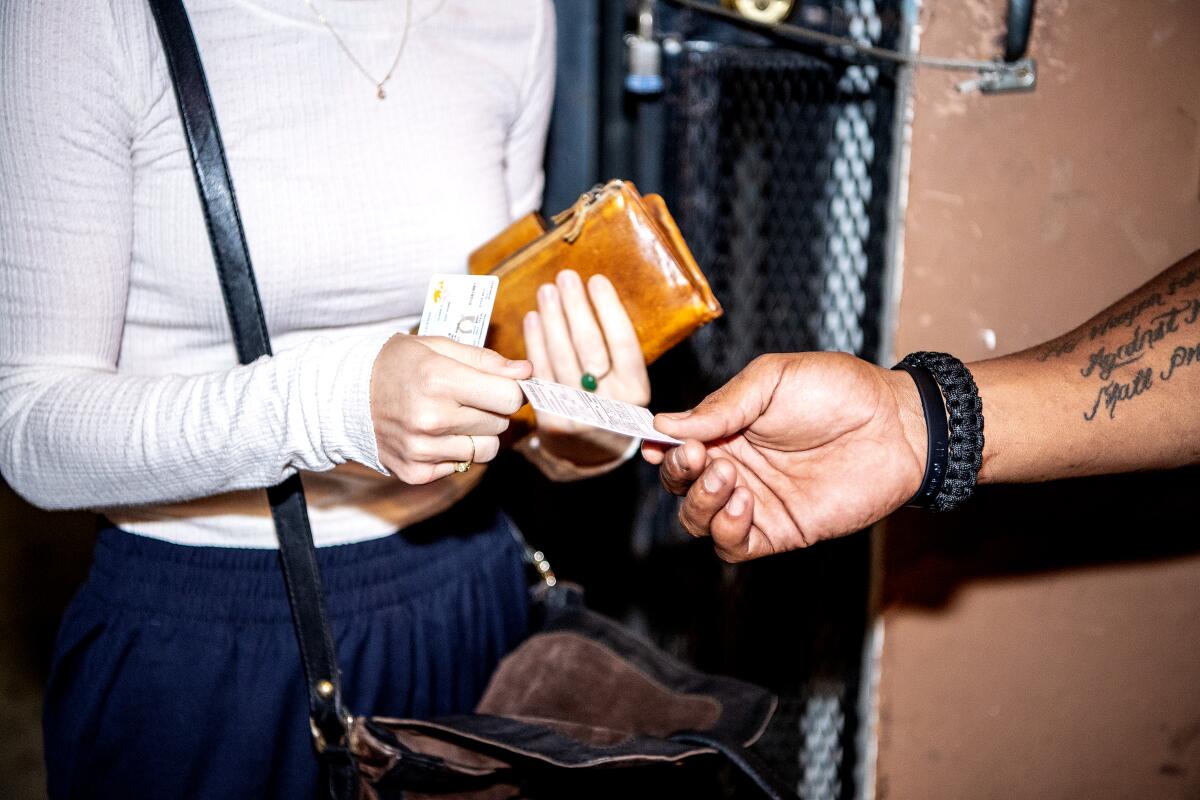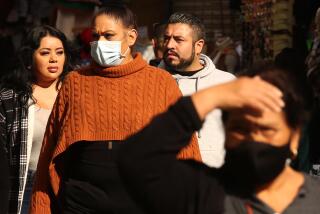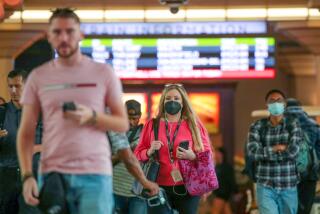Restaurants and bars implement their own health policies as Delta-variant cases rise

- Share via
First came the Instagram post, then came the hate speech and anonymous phone calls. Still, Lance Barresi says he’d do it all over again.
On July 18, the owner of Permanent Records Roadhouse, Cypress Park’s combination bar, record store and music venue, took to Instagram to share his establishment’s new COVID-19 policy: To get in, customers now need to present either proof of vaccination or a negative COVID test dated within the last 72 hours prior to entry, in addition to ID.
That policy opened the floodgates.
Barresi says his staff immediately started to receive comments, direct messages and phone calls proclaiming them Nazis and communists, and telling them — in one case yelling at them — that the bar is violating HIPAA, the federal healthcare privacy law. (It isn’t.)
“We’ve tried to have cool-headed conversations where we try to explain the situation, and they don’t want to hear that,” he said. “They just want to be a loud voice over the top of us, criticizing our decision. But it’s not anyone in person, and that’s what I’ve heard from other bar owners who’ve implemented the same policy. It’s a lot of noise on the internet.”
Permanent Records Roadhouse is part of a growing chorus of Los Angeles-area restaurants and bars implementing their own COVID restrictions as the highly transmissible Delta variant causes infection rates in the region — and many parts of the country — to climb. With California reopened on June 15, the state abandoned its color-coded tier system and, with it, guidelines for table spacing, capacity limits and mask mandates.
For a brief time, the hospitality industry was left without much guidance. Then, in mid-July, L.A. County mandated a return to indoor masking, regardless of vaccination status. Last week, health officials urged fully vaccinated Californians to resume wearing masks in indoor public settings, and the CDC recommended a return to indoor masking in public settings even for vaccinated Americans in places experiencing “substantial” or “high” coronavirus transmission rates.
Some restaurateurs and bar owners feel indoor masking is sufficient after navigating 16 months of decimated sales, a cutthroat hiring market and occasionally ambiguous, often-changing dining regulations. Others are taking health guidelines into their own hands, by requiring staff vaccinations, proof of customer vaccination or negative COVID test, or preemptively banning on-site dining in an effort to curb the Delta variant’s rapid spread.
The decision to require vaccine cards or negative test results, Barresi said, was spurred by a similar policy at East Hollywood bar Gold-Diggers, which was announced on July 15. He likens it to lining up a series of dominoes within Los Angeles that spreads, ideally, across the country: If enough local small businesses line up to enforce vaccination for entry, the chain reaction might motivate millions to sign up.
In L.A. a growing number of bars and restaurants have announced vaccine-card or test-result policies, including Osteria La Buca, Akbar, the Short Stop, Gigi’s and Tramp Stamp Granny’s.
It’s not an ideal situation, Barresi admits, but his bouncer — stationed at the door during live shows and on weekends — now checks for the bar’s COVID requirements in addition to ID. On the other nights, staff members behind the bar take on the task. The team is concerned about fake vaccination cards just as much as it is about fake IDs, but admits there’s not much it can do, should it find one, beyond barring entry.
Live shows, for the time being, have moved outdoors, and disposable microphone covers are provided for the talent and changed between singers in tandem with disinfecting the equipment. When customers shop for records, as opposed to sit at the bar, they need to mask up.
“I feel our hand was forced because there was not enough guidance,” Barresi said. “I think unfortunately a politician’s role — or at least part of it — is to be reelected, and making unpopular decisions or policy changes ... is something they try to avoid, generally. That’s really unfortunate because that’s why we’re being put into the position that we’re being put into: because the guidance hasn’t come from the top down.”
Confectioner, baker and cafe proprietor Valerie Gordon never reverted to a maskless indoor policy for staff or customers of Valerie Echo Park. She and her husband, confectioner and co-owner Stan Weightman Jr., consulted with their team — and the answer was nearly unanimous: Everyone, including vaccinated customers, should leave their masks on.
The neighborhood cafe stayed open throughout much of the last 16 months due to takeout service, buoyed by the confectionery’s national chocolate-shipping service. The cafe reopened for on-site, outdoor dining Father’s Day weekend, all the while requiring guests to wear masks indoors — both displaying the policy via sandwich board out front and making disposable masks available to guests at the door.
“We really saw a trajectory, and it was like, ‘Let’s get in front of this,’” Gordon said. “What we’ve never done is wait until people are sick to make a choice. It’s been about potential threat; we’ve got a 9-year-old at home that’s not vaccinated. We have employees with kids that aren’t vaccinated. We have a ton of customers coming in with kids that are not vaccinated, and as a mom, that’s really at my forefront.”
Customers have been primarily understanding of the rule, but just before L.A. County’s return to indoor masking, one allegedly vaccinated guest refused to mask up despite multiple requests from the staff and Gordon herself.
“He said, ‘You’re telling me I can’t be in here without a mask on?’ And I said, ‘That’s absolutely what I’m saying to you, and you are welcome to leave if you don’t want to put on a mask,’” Gordon recalled. “He said, ‘That’s outrageous,’ and I said, ‘That’s OK. You can leave if you don’t want to put on a mask, and at this point I’m asking you to leave if you don’t put on a mask.’ He said, ‘I’m going public with this.’ And I said, ‘Please do! Please do.’”
Gordon said the customer then stepped outside and proceeded to take multiple photos of the restaurant and its signage. “I quickly went out there because I wanted to be sure he had my full name, to quote me,” she added.
In late July as Gordon and Weightman watched the Delta variant gain momentum, Valerie Echo Park temporarily ceased on-site dining, reverting to takeout orders only. Remaining open for dining now, Gordon said, felt like playing “Russian roulette.” They’re reassessing L.A. County COVID figures and their operations each week and are grateful their shippable confections provide another revenue stream.
The decision to implement strict in-house health and safety guidelines extends far beyond Los Angeles. Last week Shake Shack founder and Union Hospitality Group restaurateur Danny Meyer announced that not only would proof of vaccination be required for entry to his full-service restaurants — including locations such as Gramercy Tavern in New York City and Maialino Mare in Washington, D.C. — it will be required for all restaurant staff. (Meyer said the new guidelines do not apply to Shake Shack, which will come up with its own policies.)
In France, President Emmanuel Macron recently mandated proof of vaccination or negative COVID-19 test results for entry to museums and movie theaters, as well as dining in at restaurants.
Restaurateur Florent Marneau emigrated from Fontainebleau, southeast of Paris, years ago, and he’s been keeping an eye on the rising COVID cases in his home country as well as Macron’s controversial “health pass.” The Marché Moderne chef and co-owner doesn’t necessarily agree with it.
“If it helps get rid of the whole thing fast, maybe it’s a good idea, but it’s a double-edged sword at the same time: What do we have to go through? We’re going to have to kill a lot of restaurants just to make it through,” said Marneau, who operates the French fine-dining restaurant in Newport Beach with his wife, chef Amelia Marneau. “I have tried not to be too political about it. Of course, life first — you want to protect people, you don’t want to expose anyone — but at the same time there’s a lot of people losing jobs or quitting. Of course you worry about this getting worse, and hopefully it won’t. I think it’s so much more political in the U.S. than it is in Europe.”
Marneau shared that while their staff is fully vaccinated, they would not mandate vaccinations or require proof — adding that he’s “not in Delta mode yet.” The team is more preoccupied with keeping operations running with what little staff it has. Marneau says Marché will follow current Orange County guidelines. (County officials are advising all residents to follow guidelines issued July 28 by the California Department of Public Health, including universal masking indoors.)
Marché Moderne’s fine-dining takeout boxes helped sustain the restaurant through 2020, and should they need to close on-site dining again, the chefs hope their successful to-go program can offset operating costs once more.
Chef Ross Pangilinan operates three restaurants: Mix Mix Kitchen Bar in Santa Ana, Terrace by Mix Mix in Costa Mesa and ReMix Kitchen Bar in Long Beach. Following two counties’ sometimes differing sets of guidelines, he says, has been confusing at times.
“For me, Orange County kind of saved us and didn’t let us fail; in Long Beach and L.A., we’re still trying to get things on the right track,” he said, adding: “I feel Orange County has been helping businesses much more, and it’s been easier to operate. L.A.’s been harder to operate in; there’s more rules, and there’ve been more lockdowns.”
Pangilinan, like Marneau, said he is more focused on a staffing shortage. He said he is wary of the Delta variant but feels there is sufficient guidance as is, adding that there has never been an outbreak at any of his three restaurants and that staff members are still masking at all three locations. The chef knows more guidelines and shutdowns for restaurants could be possible as COVID-19 figures continue to increase but that, until more guidance is issued, his restaurants will continue as they are.
“If they do, they do,” Pangilinan said. “We’re going to follow whatever their guidelines are. It is what it is, and we’ve got to keep on finding a way to survive.”
More to Read
Eat your way across L.A.
Get our weekly Tasting Notes newsletter for reviews, news and more.
You may occasionally receive promotional content from the Los Angeles Times.











